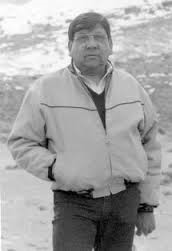Aragon, Don

Don Aragon
Don Aragon is the Executive Director of the Wind River Environmental Quality Commission. In this position, he examines air and water quality and the processes and problems associated with oil production. He endeavors to safeguard natural resources and human health. He and his staff also collaborate with the EPA to ensure that the corporations doing business comply with environmental laws and regulations, including the Safe Drinking Water Act. Aragon also served on the National Environmental Justice Advisory Council (NEJAC), where Aragon was able to see the impact of environmental injustices on all people.
“Doing something for the people is one of the reasons I’m still here. Not just me, I have respect for lots of tribal environmental directors who are doing the same thing…this work is all about what we believe will be beneficial to the people.” - Don Aragon, 2005.
Aragon, Don. 2007. The Wind River Indian Tripes. International Journal of Wilderness vol 13.2. https://ijw.org/august-2007/
Don Aragon – the youngest of nine children – was born in Fort Washington, Wyoming, to ranchers Lucinda and Pete Aragon in 1945. His parents stressed the importance of education, honesty, and hard work. These values are reflected in Aragon’s ideals and accomplishments.
Aragon’s first job as a lab and X-ray technician with Wyoming’s Riverton Hospital exposed him to the health impacts of a poor living environment, including unsafe drinking water and unhealthy sanitation practices. Aragon first attended Southwestern University, where he worked on a bachelor of science degree in Medical Technology. After Southwestern University, he worked as a research technician for the University of Washington’s School of Medicine and Dentistry. This job provided additional opportunities for Aragon to explore histology and medical work, including documenting the symptoms associated with fetal alcohol poisoning in native peoples. While working at the University of Washington, he attended Western Wahington University and received a bachelor’s degree in business administration. While he initially intended to work as a hospital administrator after completing his bachelor’s degree, Aragon’s interest and commitment to ensuring that everyone has safe living conditions drew him away from medicine and directed him toward the environmental field.
Aragon is currently the Executive Director for the Wind River Environmental Quality Commission for the Shoshone and Arapaho tribes. In this position, he examines air and water quality and the processes and problems associated with oil production. He endeavors to safeguard natural resources and human health. He and his staff also collaborate with the EPA to ensure that the corporations doing business comply with environmental laws and regulations, including the Safe Drinking Water Act.
While serving on the National Environmental Justice Advisory Council (NEJAC), Aragon was able to see the impact of environmental injustices on all people. Aragon states that it was a great honor to be named to this council and refers to it as one of the highlights of his career. He also cites the two years he spent with the Indigenous People Subcommittee of the EPA as another career highlight. Additionally, he has served on the Human Health Committee and as chair of the Haskell Environmental Research Studies Center (HERS) Advisory Board. Through his work with these councils and committees, Aragon assisted various agencies in improving environmental conditions for minorities.
Aragon improves individuals’ health by ensuring access to clean air and water. His work addresses the health disparities Indigenous communities face in the United States. Argon worked as a medical technician for 15 years and spent ten years at the University of Washington. While in Seattle, Aragon worked with the Seattle Indian Health Board, frequently seeing cases of Indigenous people “with illnesses that were related to the contamination of the environment” (Yazzie, 1995).
This ability to assist people and bring about environmental change keeps Aragon in the environmental field. When asked what has made him stick with a career in the environmental field, Aragon replied, “The people. Doing something for the people is one of the reasons I’m still here. Not just me, I have respect for lots of tribal environmental directors who are doing the same thing…this work is all about what we believe will be beneficial to the people” (2005).
Aragon attributes much of his success to four instrumental mentors: Luana Reyes, Dr. Calvin Watness, Star Weed, and his father, Pete Aragon. Luana Reyes was the Executive Director of the Seattle Indian Health Board. Aragon states, “She taught me a lot about managing people and how to work with tribal governments.” Dr. Calvin Watness is the tribal administrator for the Puyallup tribe. He shared his positive outlook with Aragon. He taught Aragon how to negotiate and work with challenging individuals and groups. Watness helped Aragon learn that there is always room for discussion so that everyone can meet some of their goals. Shoshone tribal elder, Star Weed, shared his fantastic outlook on life with Aragon. According to Aragon, “Star Weed feels that we’re put here for a specific reason. He taught me that it’s important to be respectful and honest with people. We are part of the solution, not part of the problem” (2005). Finally, his father instilled in him a strong work ethic.
Interview conducted by Multicultural Environmental Leadership Development Initiative staff. 2016. University of Michigan – School of Natural Resources and Environment. Ann Arbor, MI.
Taylor, Dorceta (Ed.). 2005. The Paths We Thread: Profiles of the Careers of Minority Environmental Professionals. Minority Environmental Leadership Development Initiative, University of Michigan School of Natural Resources and Environment.
Yazzie, P.T. (1995, December). Aragon defines Native American roles in environmental protection. Earth Medicine, 2-3. https://engg.k-state.edu/hsrc/EarthMedicine.12_95.pdf
(Provided Photo)